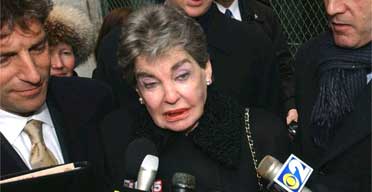Leona Helmsley, the "Queen of Mean" whose legendary cruelty towards her employees and disdain for "little people" became the unacceptable face of New York high society in Ronald Reagan's 1980s, died yesterday of a heart attack aged 87.
She died in Dunnellen Hall, the summer house in Connecticut that played a central role in her very public downfall in 1989 when she was found guilty of tax evasion and forced to serve 18 months in jail.
It was a housekeeper at the hall who revealed in the course of the trial the phrase that was to hang over the hotel magnate for the rest of her life: "We don't pay taxes," the housekeeper said her employer once told her. "Only the little people pay taxes."
How Helmsley, alongside her husband, Harry, came to form an empire worth billions - including the Empire State Building, the Park Lane Hotel and a 100-seat private jet with bedroom attached - only to be brought as low as a New York prison cell ranks alongside that of Wall Street's Gordon Gekko as one of the defining stories of the money-making 80s.
One moment she was being lauded in glossy magazines and New York salons as an unparalleled businesswoman, philanthropist and hostess of exotic Manhattan parties; the next people were lining up to lament her excesses.
Ed Koch, the city's then mayor, called her the Wicked Witch of the West. (A later mayor rose to prominence as one of her prosecutors: Rudy Giuliani.) Her own lawyer, defending her during the 1989 trial portrayed her to the jury as a "tough bitch" and when the judge came to hand out sentence he said her conduct had been the "product of naked greed. You persisted in the arrogant belief that you were above the law."
Helmsley's own image of herself was very different. She put herself forward in a series of television adverts in which she played the role of Queen of the Palace, a reference to the Helmsley Palace Hotel, presenting a face of the stern manager who demanded on the part of her customers the best in standards. Such championing of the consumer was one aspect of the Reagan decade, and it helped propel her and her husband to a fortune put at its peak at over $5bn - and into a legendary feud with Donald Trump, the city's other high-profile billionaire.
But another, less wholesome aspect emerged over several weeks of the trial and eventually did for her: a disdain towards her employees bordering on penny-pinching that was surprising for one in possession of such fabulous wealth.
She earned the hostility of contractors she brought in to work on the $3m refurbishment of Dunnellen Hall, a 28-room mansion that the couple bought in 1983. She refused to pay several, including one builder from whom she withheld $88,000 in fees on the grounds that he owed her $800,000 in "commissions" for work he had carried out on Helmsley hotels.
Several contractors are reputed to have begun the process that would end with Helmsley in jail by sending the New York Post details of how she used them to pass off the refurbishment of her private dwelling as tax-exempt business costs.
Her treatment of individual employees also cost her dear, as formerly terrified men and women queued up around the courthouse to testify against her. The jury heard how employees set up an alarm system that rang whenever she had left her home and was heading for one of her hotels. The court was also told about how Helmsley would frequently put shoes she had bought herself on the business accounts, wear them, then take them back to the store and demand a refund.
On the softer side, Leona Helmsley's adoration of her husband, who was judged incompetent to stand trial on health grounds, was evident. When he died in 1997 she said: "My fairytale is over."
Howard Rubenstein, the New York public affairs guru who represented Helmsley for 35 years, told the Guardian yesterday she should be remembered for her commitment to high standards and for her philanthropic work. She gave millions of her remaining fortune - put at $2.5bn (£1.25bn) at her death - to charities, especially hospitals and research projects.
"Her death is a time to put aside some of the innuendo and the negative criticism of Leona and think of the many positive things that she did," he said.
But it will take more than even Mr Rubenstein's substantial publicity skills to prevent the obituary writers placing greed at least as prominently as philanthropy among the list of her essential qualities.
If there's a moral to her story it is perhaps this: be nice to the little people, as it hurts when they bite back.
Bad blood
The relationship between Donald Trump and Leona Helmsley, the two titans of New York property in the 80s and 90s, is the stuff of legend. The two shared a billionaire lifestyle and a mutual hatred that gave birth to one of New York's bitterest feuds. Their rivalry was centred on their tussle for the city's most famous landmark, the Empire State building. In 1995 Trump, who owned the Empire State jointly with a Japanese consortium, claimed Helmsley's management company had let the building go to rack and ruin, turning it into a "tarnished, second rate, rodent infested commercial building". Helmsley and her husband, Harry, responded by filing their own $100m lawsuit accusing Trump and others of "irresponsible and unfounded actions" to disparage their management of the building. Among the insults traded over the years, Trump is said to have called Helmsley "a horrible, horrible human being", while Helmsley was more succinct: "I hate Donald Trump," she said.
